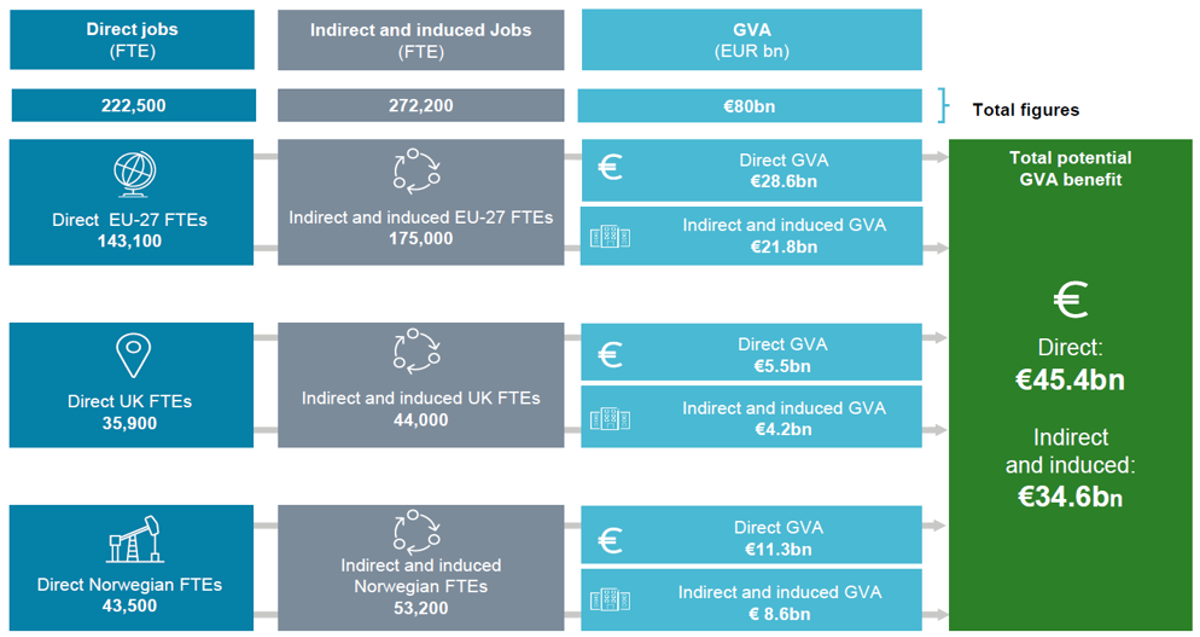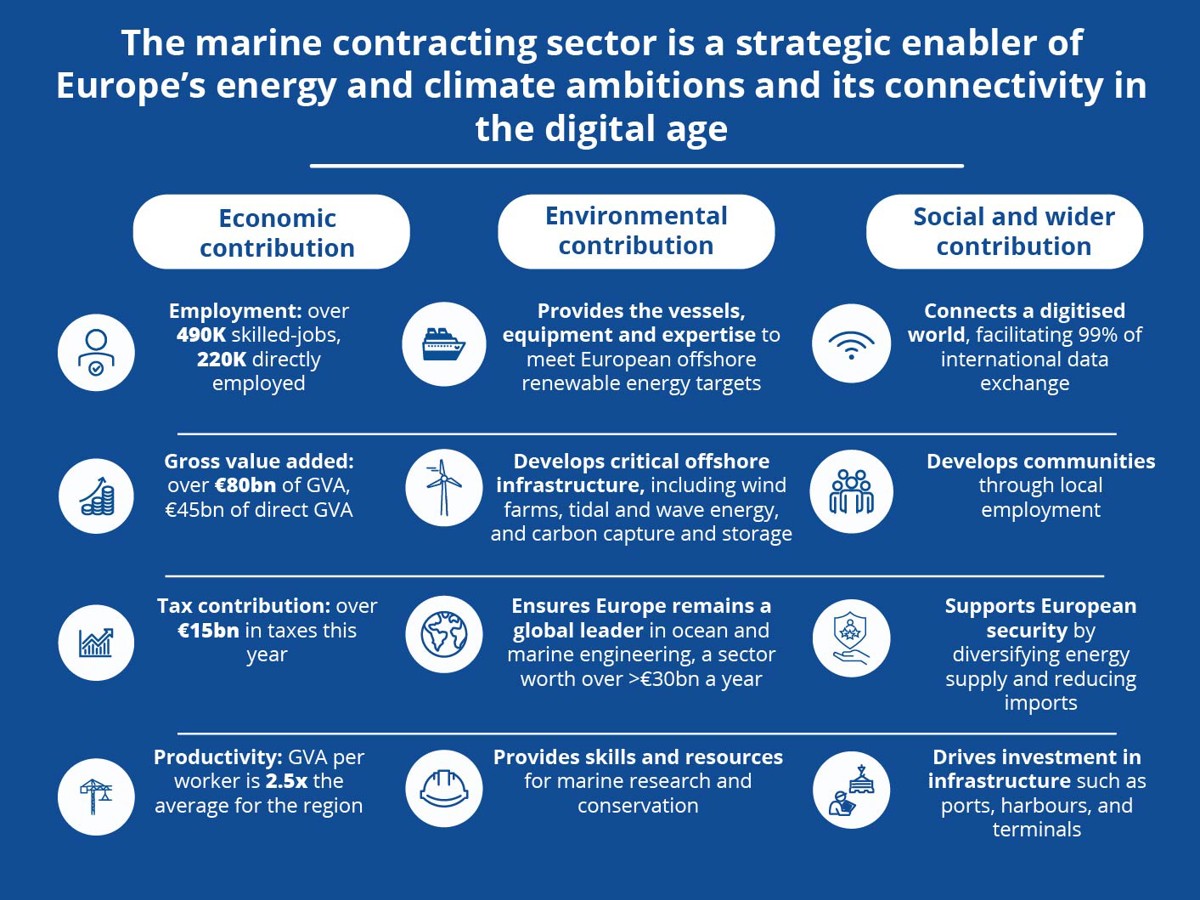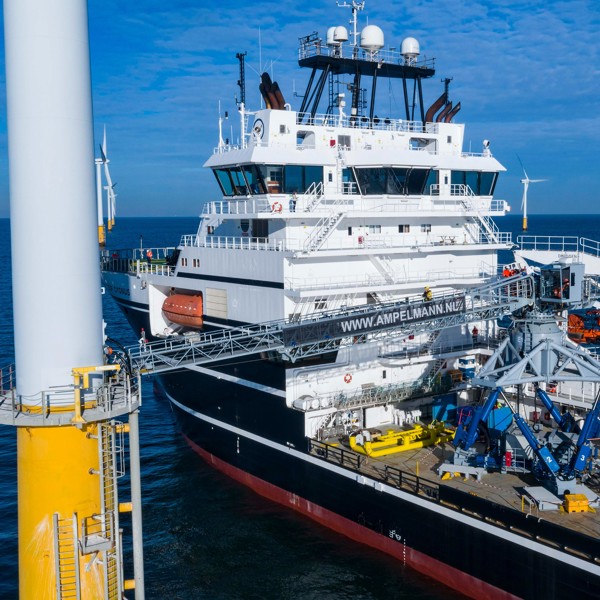● New economic study finds marine contracting sector generates €80bn in GVA and more than 490,000 skilled jobs in Europe.
● However, regulatory certainty is needed to deliver Europe’s ambitious offshore renewable energy targets, International Marine Contractors Association (IMCA) warns.
● IMCA calls for recognition as strategic sector by EU and European governments and partnership to unlock investment, training, and regulatory alignment.
The marine contracting sector is a “critical” strategic enabler of Europe’s energy and climate ambitions and plays an essential role in safeguarding Europe’s digital connectivity, a new economic impact assessment authored by PA Consulting has revealed.
The study — covering the Europe, UK, and Norway — finds that the sector is expected to generate more than €45bn in direct gross value added (GVA) in 2025 and support over 220,000 direct jobs, while the GVA-per-worker in marine contracting is more than 2.5 times the European average, highlighting the high-value impact of the sector.
Including indirect and induced impacts, PA Consulting found that the marine contracting sector will contribute more than 490,000 jobs, and €80bn in GVA in 2025.
This is the first comprehensive study of its kind into marine contracting’s economic and strategic role.

Source: PA Consulting
The study provides a detailed picture of a sector that remains under-recognised by policymakers — despite being central to Europe’s renewable energy infrastructure — while also highlighting a growing tension around future wind energy targets.
Responding to the research, IMCA said that Europe’s ambition to install 300-400 GW of offshore wind by 2050 cannot be realised without providing investment certainty to the marine contracting sector, given the offshore construction fleet’s essential role in building, installing, and maintaining the infrastructure powering the clean energy transition.
PA Consulting’s report sets out how the marine contracting sector is responsible for installing and maintaining offshore wind turbines and all offshore energy infrastructure, including laying subsea cables, deploying power interconnectors, enabling carbon capture and storage (CCS), decommissioning ageing infrastructure, and safeguarding critical energy assets. Its capabilities go beyond vessels alone — including remotely operated vehicles (ROVs), advanced diving operations, survey and trenching equipment, and highly specialised engineering teams that operate in the world’s most challenging offshore environments.
The sector also plays a critical role in improving energy security by reducing Europe’s reliance on imported fossil fuels. And by protecting European energy supply, interconnector, and telecoms infrastructure, the marine contracting services sector improves European security in an increasingly volatile world, making Europe more resilient to geopolitical and climate threats.
To meet its 2050 offshore wind targets, Europe will need to deploy more than 10,000 offshore wind turbines. The sector has the potential to enable the installation of the turbines required to meet offshore wind capacity targets in the EU, UK, and Norway, with the right commercial and regulatory environment.
However, this will demand investment in heavy-lift vessels, specialist equipment, and trained offshore crews, as well as upgraded port infrastructure. With vessels expected to operate for 20 years or more, companies need long-term policy certainty before committing to major investments.
Between 2025 and 2030, offshore wind installations have the potential to offset up to 3,100 million tonnes of CO₂e — a figure equivalent to removing more than 650 million cars from the road for one year, the report says, citing analysis from the Global Wind Energy Council and US Environmental Protection Agency emissions factors.

Europe’s energy transition depends on the capabilities of marine contractors — and our members are ready to partner with EU policymakers to deliver it
“Europe’s energy transition depends on the capabilities of marine contractors — and our members are ready to partner with EU policymakers to deliver it,” said Iain Grainger, CEO of IMCA. “We need joined-up thinking and long-term policy certainty to meet future demand. The sector is ready — but it cannot do this alone.”
“Marine contractors are ready to invest,” said Lee Billingham, IMCA Director of Strategy. “But you can’t greenlight multi-million dollar decisions when regulators are pushing rapid decarbonisation — from the EU emissions trading scheme to the IMO’s net zero framework for shipping — without clarity on which alternative fuels will be available, or where. Port access, fuel infrastructure, and regulatory alignment all need to move in sync. To deliver its targets, the EU and European governments need to work closely with the marine contracting sector to provide the certainty required for long-term investment.”
Alon Carmel, energy transition expert from PA Consulting, said: “Our study finds that the economic contribution of the marine contracting sector to the wider European economy is highly significant. More than 220,000 direct jobs and €45bn in direct GVA a year related to those jobs means there is great economic value in this sector. In addition, the sector plays a critical role installing and maintaining offshore energy infrastructure for net zero investments, as well as telecoms cables vital to our increasingly data-driven economies.”

Source: PA Consulting. Data on international data exchange from the International Telecommunication Union
“Marine contractors are at the frontline of Europe’s green transition,” added Grainger. “Our sector already delivers tens of billions in value and hundreds of thousands of skilled jobs. Yet Europe’s energy security and climate goals demand investment in offshore infrastructure – and fast. To meet that challenge, policymakers must recognise marine contractors as key providers of strategic infrastructure. We need clear, consistent support for new shipyards, cables and crews, or risk falling behind.”
Grainger noted that the industry currently “stands alongside Europe’s largest industries” in economic scale and is “a vital part of our industrial base”.



Fragile Lifelines: Protecting Subsea Cables in the Baltic
15 October 2025